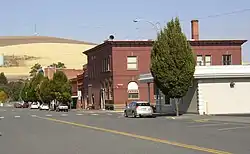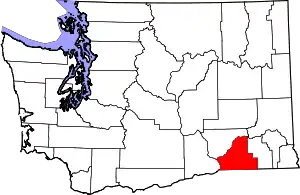Waitsburg, Washington
Waitsburg is a city in Walla Walla County, Washington, United States. The population was 1,217 at the 2010 census. Waitsburg has a unique city classification in Washington state, being the state's only city which still operates under its territorial charter.
Waitsburg, Washington | |
|---|---|
 Waitsburg main street, pictured in 2006 (Town Hall is the two-story building in foreground) | |
 Location of Waitsburg, Washington | |
| Coordinates: 46°16′5″N 118°9′15″W | |
| Country | United States |
| State | Washington |
| County | Walla Walla |
| Area | |
| • Total | 1.16 sq mi (3.01 km2) |
| • Land | 1.16 sq mi (3.01 km2) |
| • Water | 0.00 sq mi (0.00 km2) |
| Elevation | 1,263 ft (385 m) |
| Population | |
| • Total | 1,217 |
| • Estimate (2019)[3] | 1,231 |
| • Density | 1,058.47/sq mi (408.62/km2) |
| Time zone | UTC-8 (Pacific (PST)) |
| • Summer (DST) | UTC-7 (PDT) |
| ZIP code | 99361 |
| Area code | 509 |
| FIPS code | 53-75565 |
| GNIS feature ID | 1512768[4] |
| Website | City of Waitsburg |

History
Waitsburg was first settled in 1859 by Robert Kennedy. It was named for Sylvester M. Wait, who established a mill there in 1864. Wait previously established and named the city of Phoenix, Oregon, several years earlier.[5][6] William Perry Bruce and his wife, Caroline, moved to Waitsburg in 1861, some two decades before Waitsburg was officially incorporated on November 25, 1881. In 1882, they built a large home in the town, which today functions as a museum.[7]
Geography
Waitsburg is located at 46°16′N 118°9′W (46.2681, -118.1543).[8]
According to the United States Census Bureau, the city has a total area of 1.12 square miles (2.90 km2), all of it land.[9]
Climate
This region experiences warm (but not hot) and dry summers, with no average monthly temperatures above 71.6 °F. According to the Köppen Climate Classification system, Waitsburg has a warm-summer Mediterranean climate, abbreviated "Csb" on climate maps.[10]
| Climate data for Waitsburg, Washington | |||||||||||||
|---|---|---|---|---|---|---|---|---|---|---|---|---|---|
| Month | Jan | Feb | Mar | Apr | May | Jun | Jul | Aug | Sep | Oct | Nov | Dec | Year |
| Average high °C (°F) | 4 (40) |
7 (45) |
12 (53) |
16 (61) |
21 (69) |
25 (77) |
31 (87) |
30 (86) |
24 (76) |
18 (64) |
9 (49) |
5 (41) |
17 (62) |
| Average low °C (°F) | −4 (25) |
−2 (29) |
1 (34) |
3 (38) |
7 (44) |
10 (50) |
13 (55) |
12 (54) |
8 (47) |
4 (39) |
0 (32) |
−3 (27) |
4 (39) |
| Average precipitation mm (inches) | 61 (2.4) |
48 (1.9) |
53 (2.1) |
41 (1.6) |
41 (1.6) |
33 (1.3) |
13 (0.5) |
13 (0.5) |
23 (0.9) |
41 (1.6) |
64 (2.5) |
64 (2.5) |
490 (19.3) |
| Source: Weatherbase [11] | |||||||||||||
Demographics
| Historical population | |||
|---|---|---|---|
| Census | Pop. | %± | |
| 1880 | 248 | — | |
| 1890 | 817 | 229.4% | |
| 1900 | 1,011 | 23.7% | |
| 1910 | 1,237 | 22.4% | |
| 1920 | 1,174 | −5.1% | |
| 1930 | 869 | −26.0% | |
| 1940 | 936 | 7.7% | |
| 1950 | 1,015 | 8.4% | |
| 1960 | 1,010 | −0.5% | |
| 1970 | 953 | −5.6% | |
| 1980 | 1,035 | 8.6% | |
| 1990 | 990 | −4.3% | |
| 2000 | 1,212 | 22.4% | |
| 2010 | 1,217 | 0.4% | |
| 2019 (est.) | 1,231 | [3] | 1.2% |
| U.S. Decennial Census[12] | |||
2010 census
As of the census[2] of 2010, there were 1,217 people, 475 households, and 328 families residing in the city. The population density was 1,086.6 inhabitants per square mile (419.5/km2). There were 522 housing units at an average density of 466.1 per square mile (180.0/km2). The racial makeup of the city was 93.1% White, 0.2% African American, 1.5% Native American, 0.7% Asian, 0.2% Pacific Islander, 1.9% from other races, and 2.3% from two or more races. Hispanic or Latino of any race were 5.3% of the population.
There were 475 households, of which 37.5% had children under the age of 18 living with them, 53.3% were married couples living together, 10.7% had a female householder with no husband present, 5.1% had a male householder with no wife present, and 30.9% were non-families. 25.7% of all households were made up of individuals, and 14.7% had someone living alone who was 65 years of age or older. The average household size was 2.56 and the average family size was 3.04.
The median age in the city was 41 years. 26.4% of residents were under the age of 18; 8% were between the ages of 18 and 24; 21.2% were from 25 to 44; 28.4% were from 45 to 64; and 16.1% were 65 years of age or older. The gender makeup of the city was 49.6% male and 50.4% female.
2000 census
As of the census of 2000, there were 1,212 people, 490 households, and 314 families residing in the city. The population density was 1,279.5 people per square mile (492.6/km2). There were 522 housing units at an average density of 551.1 per square mile (212.2/km2). The racial makeup of the city was 94.80% White, 0.58% African American, 0.41% Native American, 0.66% Asian, 1.16% from other races, and 2.39% from two or more races. Hispanic or Latino of any race were 2.81% of the population.
There were 490 households, out of which 32.9% had children under the age of 18 living with them, 51.0% were married couples living together, 9.0% had a female householder with no husband present, and 35.9% were non-families. 31.4% of all households were made up of individuals, and 15.9% had someone living alone who was 65 years of age or older. The average household size was 2.47 and the average family size was 3.13.
In the city, the age distribution of the population shows 29.7% under the age of 18, 5.4% from 18 to 24, 24.8% from 25 to 44, 23.5% from 45 to 64, and 16.6% who were 65 years of age or older. The median age was 39 years. For every 100 females, there were 97.4 males. For every 100 females age 18 and over, there were 92.3 males.
The median income for a household in the city was $33,527, and the median income for a family was $40,865. Males had a median income of $31,625 versus $21,518 for females. The per capita income for the city was $16,803. About 10.6% of families and 14.0% of the population were below the poverty line, including 14.8% of those under age 18 and 10.0% of those age 65 or over.
References
- "2019 U.S. Gazetteer Files". United States Census Bureau. Retrieved August 7, 2020.
- "U.S. Census website". United States Census Bureau. Retrieved 2012-12-19.
- "Annual Estimates of the Resident Population for Incorporated Places in Washington: April 1, 2010 to July 1, 2019". United States Census Bureau. May 2020. Retrieved May 27, 2020.
- "US Board on Geographic Names". United States Geological Survey. 2007-10-25. Retrieved 2008-01-31.
- Majors, Harry M. (1975). Exploring Washington. Van Winkle Publishing Co. p. 138. ISBN 978-0-918664-00-6.
- Meany, Edmond S. (1923). Origin of Washington geographic names. Seattle: University of Washington Press. p. 330.
- http://www.waitsburghistoricalsociety.org/index.html museum
- "US Gazetteer files: 2010, 2000, and 1990". United States Census Bureau. 2011-02-12. Retrieved 2011-04-23.
- "US Gazetteer files 2010". United States Census Bureau. Retrieved 2012-12-19.
- Climate Summary for Waitsburg, Washington
- "Weatherbase.com". Weatherbase. 2014. Retrieved on June 4, 2014.
- United States Census Bureau. "Census of Population and Housing". Retrieved July 21, 2014.
External links
 Media related to Waitsburg at Wikimedia Commons
Media related to Waitsburg at Wikimedia Commons- Official website
- History of Waitsburg at HistoryLink
- The Times (Waitsburg-based news medium)
